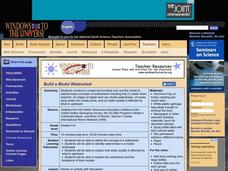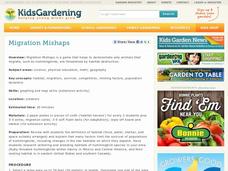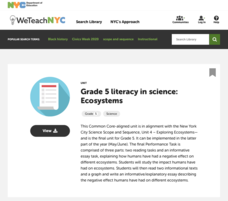Curated OER
Non-Point Source Pollution Program
Written as field trip preparation to Gateway National Recreation Area, this resource is also appropriate for any class that is studying the impact of human activity on the environment. During the first activity, learners identify...
Curated OER
Chemical Consequences of Burning Fossil Fuels
Future scientists are introduced to the chemical consequences of burning fossil fuels, learning that fossil fuel combustion leads to the formation of oxides of three nonmetals: carbon, nitrogen, and sulfur, all of which end up in the...
Curated OER
Build a Model Watershed
Collaborative earth science groups create a working model of a watershed. Once it has been developed, you come along and introduce a change in land use, impacting the quality of water throughout their watershed. Model making is an...
Curated OER
Biotechnology Regulations
Bio-ethical laws and regulations on the federal, state, and local levels are covered in this Powerpoint discussing genetically modified food. The steps needed to get permits and approval for GMO crops and other foodstuffs are discussed....
Curated OER
Ozone Hole - Changes in the Stratosphere
Halting the depletion of the hole in the ozone layer has been one of humanity's happy recoveries from previous damage done to the environment. Meteorology masters muse the Montreal Protocol and examine data on changes in the ozone....
Curated OER
Wheel of Trouble
While teaching about endangered species, you can incorporate this activity as a take-home reminder of what is threatening the sea turtle population. It is one of those paper plate projects in which a wedge is cut out to reveal a picture...
K12 Reader
Taking Care of Earth
Provide a brief introduction to ecology and conservation with a reading passage. Learners can read the text, answer the five related questions that are included on the page, and discuss the reading.
Pulitzer Center
Exploring Downstream: Water Resources
The lack of clean water is a life-threatening plight for millions of people around the world. Through an extensive WebQuest, young environment or social studies classes compare our water availability to that of the cxitizens of Ethiopia,...
Howard Hughes Medical Institute
What is My Carbon Footprint?
Here is a lesson that walks youth through an online carbon footprint calculator produced by the University of California, Berkeley. Once learners finish inputting information, they compete a worksheet with the results. This is simple,...
Michigan State University
Bug Lyphe!
Introduce ecology classes to biodiversity and interdependence in ecosystems with a PowerPoint presentation. Then, they get up-close and personal with the invertebrate world by collecting insects, classifying them, and graphing their...
Consortium for Ocean Science Exploration and Engagement (COSEE)
One Ocean: It Matters!
Here is the first of four poignant lessons on how humans and oceans interact, even if people live far from the coast. This particular lesson also examines studies that are taking place in Antarctica of how climate change is affecting the...
National Gardening Association
Migration Mishaps
Elementary ecologists pretend to be migratory hummingbirds. They fly between wintering and nesting grounds, trying to reach a habitat haven. In a musical-chair fashion, some birds will miss out, and are removed from the game. To further...
Habitat Conservation Trust Foundation
Greenhouse Gas Game
You will need to gather a number of tokens, bags, and other various game components in order to incorporate this activity into your curriculum. Different tokens represent carbon dioxide, methane, and nitrous oxide. Printable 8.5"x11"...
Curated OER
How Will We Create a Future without Waste?
Many young people act globally by reducing, reusing, and recycling, Now they take it to the next level by upcycling. Middle schoolers design a proposal to eliminate waste by exploring the new material cycle and applying their knowledge...
Curated OER
Musical Activities for Early Childhood Inclusion
Get your movers and shakers grooving to the beat with this series of musical activities designed to meet everyone's needs! Ten games, using an assortment of instruments, bring awareness to one's body, brain, and social interactions in a...
Teach Engineering
Designing a Winning Guest Village in the Saguaro National Park
Don't desert a resource on the desert! Scholars work in groups to build on their ideas from the previous lesson to design a sustainable guest village in the Saguaro National Park. Each group produces a PowerPoint presentation to share...
Advocates for Human Rights
The Right to a Clean Environment: Water
First, young citizens learn about water consumption by doing some research themselves on their home water usage and sharing their findings with the class. Then, they do some brainstorming and devise a plan to reduce water consumption.
Channel Islands Film
Santa Cruz Island - Writing for Information
After re-viewing a documentary segment on the restoration of Santa Cruz Island,, individuals craft an essay in which they compare the views of the various stake holders featured in the video and identify the point of view they find the...
Beyond Benign
Decision Graphic Introduction
E is for economics, environment, and social equity. The fifth installment of a 15-part series has scholars first considering ecological impacts, such as determining how much water it takes to produce a can of soda. They then use decision...
New York City Department of Education
Grade 5 Literacy in Science: Ecosytems
How do humans affect ecosystems? Learners read two articles and interpret a graph to develop essays on the human impact on ecosystems. They read about human impact on tigers and manatees as a basis for their overarching papers.
Humane Education Advocates Reaching Teachers
Justice for All - Educating Youth for Social Responsibility: Grades 6-8
Teach middle schoolers how to develop healthy relationships with activities and lessons designed to create a kind and inclusive
classroom. Pupils create guidelines to develop a safe and civil learning environment. They learn how to...
Curated OER
Mother Earth Connection: Earth Day
Students read Brother Eagle, Sister Sky to appreciate the attitudes of the Native Americans to "Mother Earth." In this environmental activity, students review vocabulary environmentalism. Students compare mother Earth to mother. Students...
Curated OER
A Golden Opportunity for Science
Students participate in a varity of activities surrounding "gold." They explore the science, myths, and legends about gold and conduct a debate over the environmental problems created by gold mining in a small small mining town.
Curated OER
Ways To Go Green
In this environmental awareness worksheet, students learn how to "go green" by reading 10 tips that can be used in everyday life. Students answer 10 multiple choice questions. This is an online interactive worksheet.

























